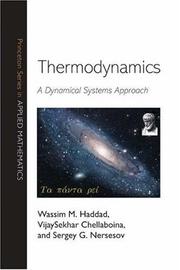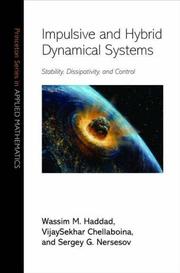| Listing 1 - 6 of 6 |
Sort by
|
Book
ISBN: 9780691153469 0691153469 9786613379719 1400842662 1283379716 9781400842667 9781283379717 Year: 2011 Publisher: Princeton, N.J. : Princeton University Press,
Abstract | Keywords | Export | Availability | Bookmark
 Loading...
Loading...Choose an application
- Reference Manager
- EndNote
- RefWorks (Direct export to RefWorks)
Modern complex large-scale dynamical systems exist in virtually every aspect of science and engineering, and are associated with a wide variety of physical, technological, environmental, and social phenomena, including aerospace, power, communications, and network systems, to name just a few. This book develops a general stability analysis and control design framework for nonlinear large-scale interconnected dynamical systems, and presents the most complete treatment on vector Lyapunov function methods, vector dissipativity theory, and decentralized control architectures. Large-scale dynamical systems are strongly interconnected and consist of interacting subsystems exchanging matter, energy, or information with the environment. The sheer size, or dimensionality, of these systems necessitates decentralized analysis and control system synthesis methods for their analysis and design. Written in a theorem-proof format with examples to illustrate new concepts, this book addresses continuous-time, discrete-time, and hybrid large-scale systems. It develops finite-time stability and finite-time decentralized stabilization, thermodynamic modeling, maximum entropy control, and energy-based decentralized control. This book will interest applied mathematicians, dynamical systems theorists, control theorists, and engineers, and anyone seeking a fundamental and comprehensive understanding of large-scale interconnected dynamical systems and control.
Lyapunov stability --- Energy dissipation --- Dynamics --- Large scale systems --- Information Technology --- General and Others --- Lyapunov stability. --- Energy dissipation. --- Dynamics. --- Large scale systems. --- Systems, Large scale --- Dynamical systems --- Kinetics --- Liapunov stability --- Ljapunov stability --- Degradation, Energy --- Dissipation (Physics) --- Energy degradation --- Energy losses --- Losses, Energy --- Engineering systems --- System analysis --- Mathematics --- Mechanics, Analytic --- Force and energy --- Mechanics --- Physics --- Statics --- Control theory --- Stability --- Clausius-type inequality. --- KalmanЙakubovichАopov conditions. --- KalmanЙakubovichАopov equations. --- KrasovskiiЌaSalle theorem. --- asymptotic stabilizability. --- combustion processes. --- comparison system. --- compartmental dynamical system theory. --- compartmental dynamical system. --- control Lyapunov function. --- control design. --- control signal. --- control vector Lyapunov function. --- convergence. --- coordination control. --- decentralized affine. --- decentralized control. --- decentralized controller. --- decentralized finite-time stabilizer. --- discrete-time dynamical system. --- dissipativity theory. --- dynamical system. --- ectropy. --- energy conservation. --- energy dissipation. --- energy equipartition. --- energy flow. --- entropy. --- feedback control law. --- feedback interconnection stability. --- feedback stabilizer. --- finite-time stability. --- finite-time stabilization. --- gain margin. --- hybrid closed-loop system. --- hybrid decentralized controller. --- hybrid dynamic controller. --- hybrid finite-time stabilizing controller. --- hybrid vector comparison system. --- hybrid vector dissipation inequality. --- impulsive differential equations. --- impulsive dynamical system. --- interconnected dynamical system. --- large-scale dynamical system. --- law of thermodynamics. --- linear energy exchange. --- maximum entropy control. --- multiagent interconnected system. --- multiagent systems. --- multivehicle coordinated motion control. --- nonconservation of ectropy. --- nonconservation of entropy. --- nonlinear dynamical system. --- optimality. --- plant energy. --- scalar Lyapunov function. --- sector margin. --- semistable dissipation matrix. --- stability analysis. --- stability theory. --- stability. --- state space. --- subsystem decomposition. --- subsystem energy. --- thermoacoustic instabilities. --- thermodynamic modeling. --- time-invariant set. --- time-varying set. --- vector Lyapunov function. --- vector available storage. --- vector comparison system. --- vector dissipation inequality. --- vector dissipative system. --- vector dissipativity theory. --- vector dissipativity. --- vector field. --- vector hybrid supply rate. --- vector lossless system. --- vector required supply. --- vector storage function. --- vector supply rate.
Digital
ISBN: 9781400842667 9780691153469 Year: 2011 Publisher: Princeton, N.J. Princeton University Press
Abstract | Keywords | Export | Availability | Bookmark
 Loading...
Loading...Choose an application
- Reference Manager
- EndNote
- RefWorks (Direct export to RefWorks)

ISBN: 1680159046 1282158309 9786612158308 1400826977 9781400826971 9781680159042 0691123276 9780691123271 9781282158306 Year: 2005 Publisher: Princeton : Princeton University Press,
Abstract | Keywords | Export | Availability | Bookmark
 Loading...
Loading...Choose an application
- Reference Manager
- EndNote
- RefWorks (Direct export to RefWorks)
This book places thermodynamics on a system-theoretic foundation so as to harmonize it with classical mechanics. Using the highest standards of exposition and rigor, the authors develop a novel formulation of thermodynamics that can be viewed as a moderate-sized system theory as compared to statistical thermodynamics. This middle-ground theory involves deterministic large-scale dynamical system models that bridge the gap between classical and statistical thermodynamics. The authors' theory is motivated by the fact that a discipline as cardinal as thermodynamics--entrusted with some of the most perplexing secrets of our universe--demands far more than physical mathematics as its underpinning. Even though many great physicists, such as Archimedes, Newton, and Lagrange, have humbled us with their mathematically seamless eurekas over the centuries, this book suggests that a great many physicists and engineers who have developed the theory of thermodynamics seem to have forgotten that mathematics, when used rigorously, is the irrefutable pathway to truth. This book uses system theoretic ideas to bring coherence, clarity, and precision to an extremely important and poorly understood classical area of science.
Thermodynamics --- Differentiable dynamical systems. --- Differential dynamical systems --- Dynamical systems, Differentiable --- Dynamics, Differentiable --- Differential equations --- Global analysis (Mathematics) --- Topological dynamics --- Chemistry, Physical and theoretical --- Dynamics --- Mechanics --- Physics --- Heat --- Heat-engines --- Quantum theory --- Mathematics. --- Addition. --- Adiabatic process. --- Applied mathematics. --- Arthur Eddington. --- Asymmetry. --- Available energy (particle collision). --- Axiom. --- Balance equation. --- Banach space. --- Boltzmann's entropy formula. --- Brillouin scattering. --- Carnot cycle. --- Classical mechanics. --- Clausius (crater). --- Compact space. --- Conservation law. --- Conservation of energy. --- Constant of integration. --- Continuous function (set theory). --- Continuous function. --- Control theory. --- Deformation (mechanics). --- Derivative. --- Diathermal wall. --- Diffeomorphism. --- Differentiable function. --- Diffusion process. --- Dimension (vector space). --- Dimension. --- Dissipation. --- Dot product. --- Dynamical system. --- Emergence. --- Energy density. --- Energy level. --- Energy storage. --- Energy. --- Entropy. --- Equation. --- Equations of motion. --- Equilibrium point. --- Equilibrium thermodynamics. --- Equipartition theorem. --- Existential quantification. --- First law of thermodynamics. --- Hamiltonian mechanics. --- Heat capacity. --- Heat death of the universe. --- Heat flux. --- Heat transfer. --- Homeomorphism. --- Hydrogen atom. --- Ideal gas. --- Inequality (mathematics). --- Infimum and supremum. --- Infinitesimal. --- Initial condition. --- Instant. --- Internal energy. --- Irreversible process. --- Isolated system. --- Kinetic theory of gases. --- Laws of thermodynamics. --- Linear dynamical system. --- Lipschitz continuity. --- Local boundedness. --- Lyapunov function. --- Lyapunov stability. --- Mathematical optimization. --- Molecule. --- Non-equilibrium thermodynamics. --- Operator norm. --- Probability. --- Quantity. --- Reversible process (thermodynamics). --- Second law of thermodynamics. --- Semi-infinite. --- Smoothness. --- State variable. --- State-space representation. --- Statistical mechanics. --- Steady state. --- Summation. --- Supply (economics). --- Systems theory. --- Temperature. --- Theorem. --- Theoretical physics. --- Theory. --- Thermal conduction. --- Thermal equilibrium. --- Thermodynamic equilibrium. --- Thermodynamic process. --- Thermodynamic state. --- Thermodynamic system. --- Thermodynamic temperature. --- Thermodynamics. --- Time evolution. --- Zeroth law of thermodynamics.

ISBN: 1400865247 9781400865246 9780691127156 0691127158 Year: 2006 Publisher: Princeton, New Jersey Oxfordshire, England
Abstract | Keywords | Export | Availability | Bookmark
 Loading...
Loading...Choose an application
- Reference Manager
- EndNote
- RefWorks (Direct export to RefWorks)
This book develops a general analysis and synthesis framework for impulsive and hybrid dynamical systems. Such a framework is imperative for modern complex engineering systems that involve interacting continuous-time and discrete-time dynamics with multiple modes of operation that place stringent demands on controller design and require implementation of increasing complexity--whether advanced high-performance tactical fighter aircraft and space vehicles, variable-cycle gas turbine engines, or air and ground transportation systems. Impulsive and Hybrid Dynamical Systems goes beyond similar treatments by developing invariant set stability theorems, partial stability, Lagrange stability, boundedness, ultimate boundedness, dissipativity theory, vector dissipativity theory, energy-based hybrid control, optimal control, disturbance rejection control, and robust control for nonlinear impulsive and hybrid dynamical systems. A major contribution to mathematical system theory and control system theory, this book is written from a system-theoretic point of view with the highest standards of exposition and rigor. It is intended for graduate students, researchers, and practitioners of engineering and applied mathematics as well as computer scientists, physicists, and other scientists who seek a fundamental understanding of the rich dynamical behavior of impulsive and hybrid dynamical systems.
Automatic control. --- Control theory. --- Dynamics. --- Discrete-time systems. --- Dynamical systems --- Kinetics --- Mathematics --- Mechanics, Analytic --- Force and energy --- Mechanics --- Physics --- Statics --- Dynamics --- Machine theory --- Control engineering --- Control equipment --- Control theory --- Engineering instruments --- Automation --- Programmable controllers --- DES (System analysis) --- Discrete event systems --- Sampled-data systems --- Digital control systems --- Discrete mathematics --- System analysis --- Linear time invariant systems --- Actuator. --- Adaptive control. --- Algorithm. --- Amplitude. --- Analog computer. --- Arbitrarily large. --- Asymptote. --- Asymptotic analysis. --- Axiom. --- Balance equation. --- Bode plot. --- Boundedness. --- Calculation. --- Center of mass (relativistic). --- Coefficient of restitution. --- Continuous function. --- Convex set. --- Differentiable function. --- Differential equation. --- Dissipation. --- Dissipative system. --- Dynamical system. --- Dynamical systems theory. --- Energy. --- Equations of motion. --- Equilibrium point. --- Escapement. --- Euler–Lagrange equation. --- Exponential stability. --- Forms of energy. --- Hamiltonian mechanics. --- Hamiltonian system. --- Hermitian matrix. --- Hooke's law. --- Hybrid system. --- Identity matrix. --- Inequality (mathematics). --- Infimum and supremum. --- Initial condition. --- Instability. --- Interconnection. --- Invariance theorem. --- Isolated system. --- Iterative method. --- Jacobian matrix and determinant. --- Lagrangian (field theory). --- Lagrangian system. --- Lagrangian. --- Likelihood-ratio test. --- Limit cycle. --- Limit set. --- Linear function. --- Linearization. --- Lipschitz continuity. --- Lyapunov function. --- Lyapunov stability. --- Mass balance. --- Mathematical optimization. --- Melting. --- Mixture. --- Moment of inertia. --- Momentum. --- Monotonic function. --- Negative feedback. --- Nonlinear programming. --- Nonlinear system. --- Nonnegative matrix. --- Optimal control. --- Ordinary differential equation. --- Orthant. --- Parameter. --- Partial differential equation. --- Passive dynamics. --- Poincaré conjecture. --- Potential energy. --- Proof mass. --- Quantity. --- Rate function. --- Requirement. --- Robust control. --- Second law of thermodynamics. --- Semi-infinite. --- Small-gain theorem. --- Special case. --- Spectral radius. --- Stability theory. --- State space. --- Stiffness. --- Supply (economics). --- Telecommunication. --- Theorem. --- Transpose. --- Uncertainty. --- Uniform boundedness. --- Uniqueness. --- Vector field. --- Vibration. --- Zeroth (software). --- Zeroth law of thermodynamics.

ISBN: 9781400826971 9780691123271 1400826977 9781680159042 1680159046 0691123276 Year: 2005 Publisher: Princeton Princeton University Press
Abstract | Keywords | Export | Availability | Bookmark
 Loading...
Loading...Choose an application
- Reference Manager
- EndNote
- RefWorks (Direct export to RefWorks)

ISBN: 9781400865246 9780691127156 Year: 2014 Publisher: Princeton, N.J. Princeton University Press
Abstract | Keywords | Export | Availability | Bookmark
 Loading...
Loading...Choose an application
- Reference Manager
- EndNote
- RefWorks (Direct export to RefWorks)
| Listing 1 - 6 of 6 |
Sort by
|

 Search
Search Feedback
Feedback About UniCat
About UniCat  Help
Help News
News